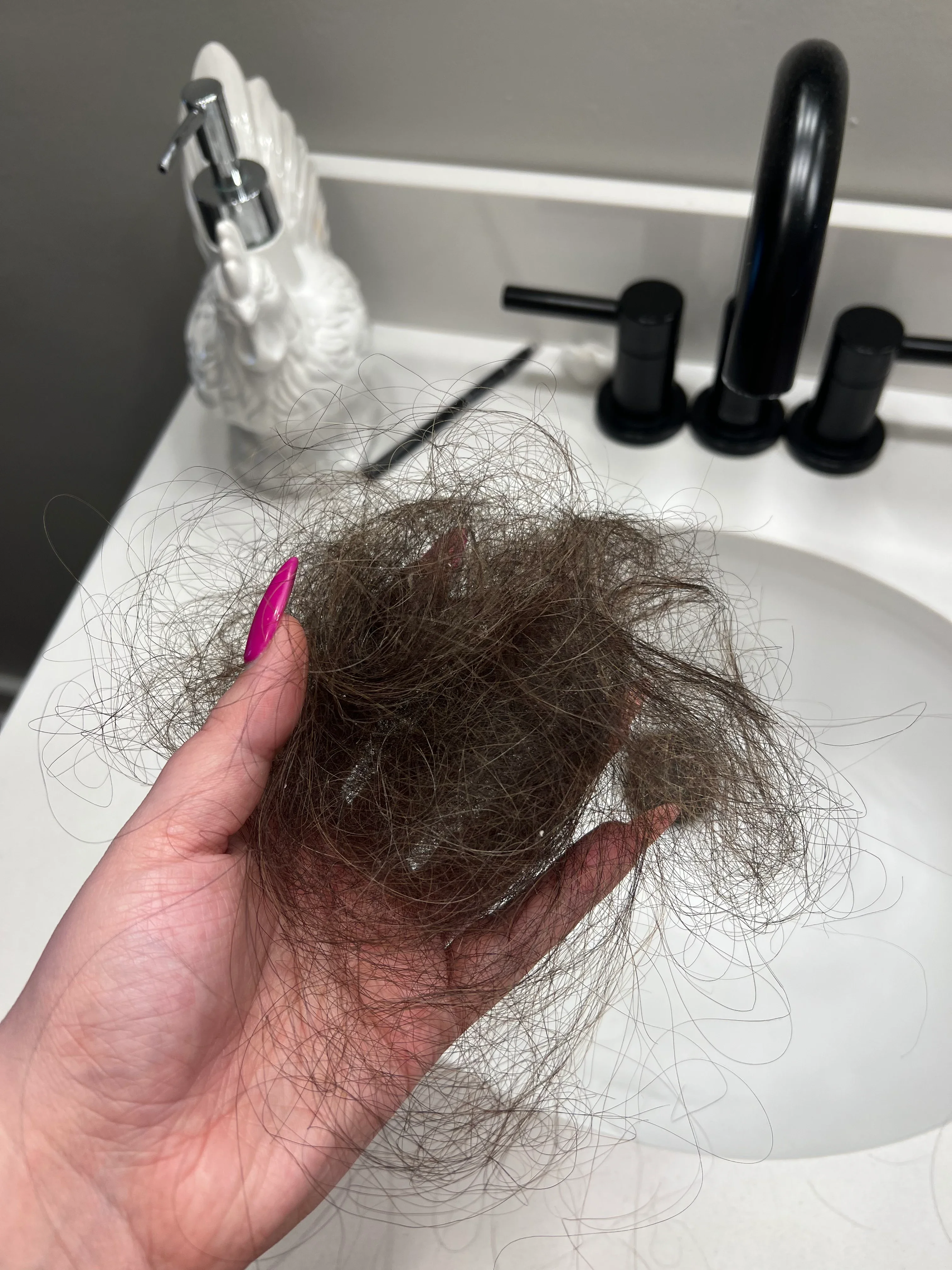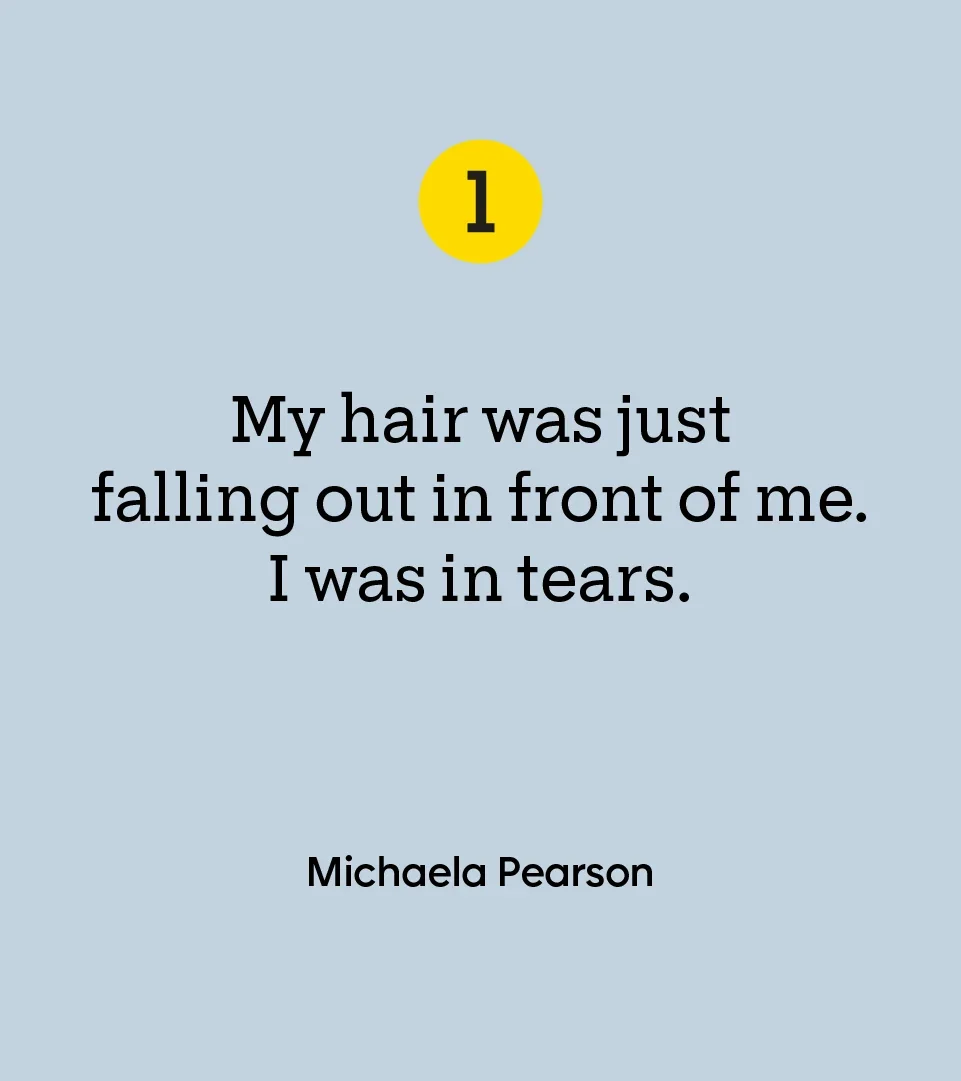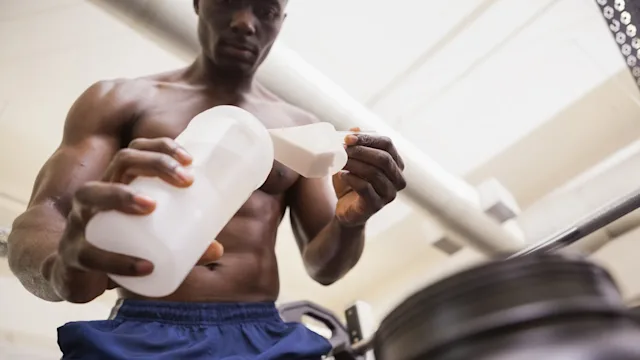Key takeaways:
Michaela Pearson was thrilled to lose 115 lbs after having weight-loss surgery at age 29. But she was upset about losing so much hair after her procedure.
A thoughtful hair-care routine helped her lose less hair and grow healthy new hair more quickly.
She advises others getting weight-loss surgery to pamper their hair and always listen to their doctors.
Michaela Pearson, a social media professional in Cincinnati, was 28 when she started to consider weight-loss surgery. For her, it was the right time.
“I started seeing an increase in my cholesterol. I had high blood pressure. I had severe sleep apnea,” she says. “I wasn’t able to do things due to weight restrictions anymore. Even something as random as going kayaking, I was told no. I stopped being able to live my life.”
She went to her doctor to learn about new injectable weight-loss medications, but her doctor recommended a gastric sleeve procedure instead. She had the bariatric surgery, and nearly a year and a half later, she says she’s thrilled to have lost 115 lbs and gone from a size 24 to a size 12.
“I’ve been to Disney World,” she says. “I love walking and exercising. It just feels good to move my body, because for the longest time, I couldn’t.”
Losing her hair in clumps 3 months after surgery


But Michaela found one aspect of the journey particularly difficult. Three months after her surgery, her long hair started falling out in clumps. Her doctors told her that hair loss — known medically as telogen effluvium — is a common side effect of a physical stressor, like surgery. But Michaela was still alarmed to see how much hair she was losing.
“I remember after surgery, I went out with my friends, and I was trying to get ready,” she says. “I was brushing my hair, and my hair was just falling out in front of me. I was in tears. I didn’t know what to do. I had lost weight. But then I’m like, ‘Now I feel worse about myself because my hair’s falling out.’”
By speaking to her doctors about her hair loss, researching online, and trying different hair-care products, Michaela figured out a routine that had her hair healthy and growing again 7 months after her surgery. She offers this advice for anyone undergoing a similar surgery who is worried about hair loss.


1. Hit your protein and water goals
After you have weight-loss surgery, your doctor is likely to give you goals for your daily intake of protein and water. For Michaela, these were at least 80 g of protein and 80 oz of water. She found that consistently hitting these goals was key for her health and for keeping her hair.
To reach her recommended amounts, Michaela eats protein-dense foods. She has also found more creative solutions.
- PropeciaFinasteride
- Men's RogaineMinoxidil Non-Prescription
- Women's RogaineMinoxidil Non-Prescription
“I started mixing in collagen [supplements] with an iced coffee in the morning — a protein coffee — to get that in,” she says.
2. Stick with your supplements


Michaela considers supplements an essential part of her hair-regrowth routine.
“With bariatric surgery, you have a little bit of malabsorption,” which is when the body has difficulty absorbing nutrients in foods, she says. “So you’re not getting as much iron as you need. You’re not getting as much calcium.”
Not getting enough critical nutrients can harm your overall health. It can also contribute to post-surgery hair loss. It’s why those who undergo weight-loss surgery are prescribed supplements afterward.
Michaela says those who are worried about hair loss should be consistent about taking their recommended supplements. For Michaela, that means never missing her multivitamin, biotin (vitamin B7) gummy, and extra calcium.
When she forgets to take her vitamins, “I start to notice that I shed my hair a little,” she says.
3. Choose hair-care products carefully
Michaela’s experience with hair loss has made her much more careful about which products she uses for her hair.
“I use all paraben-free, sulfate-free shampoo and conditioner, [plus] anything with biotin, extra collagen, [and] things like that for your hair. So just really organic, clean products,” she says.
She also avoids hair-care products promising a quick fix for hair loss.
Instead, she swears by natural, essential oils. Michaela shampoos her hair every 7 to 9 days (how often you need to wash your hair, she says, depends on its texture). The night before she washes it, she applies a mixture of rosemary and castor oil to stimulate new hair growth. The process can be a little greasy, she says, but she likes the rosemary oil smell.
4. Style gently
Michaela is also careful to avoid breaking or damaging her hair while styling it. When brushing out tangles, she starts from the bottom and works her way up gently. She uses a brush rather than a comb. And she tries to avoid overwashing it or being rough with it while styling.
“I try to use as low a heat on my hair as possible,” she says. “So instead of styling it with a straightener every day, I might do a heatless option just to try to make it even healthier. When I wear my hair up, I don’t use hard elastic bands. I use silk hair ties. I sleep on a silk pillowcase.”
5. Start early
Some hair loss after weight-loss surgery is inevitable, Michaela says. Even if she couldn’t have prevented it, she says she wishes she had started pampering her hair sooner.
“My biggest regret is not starting the supplements sooner,” she says.
In hindsight, Michaela says she would have started with the collagen and biotin and things like rosemary oil and castor oil 3 months before surgery to help with new growth.
“Start as early as possible,” she says. “Don’t wait until your hair starts to fall out.” But she also stresses that you should always consult your doctor before beginning any new supplements.
She says the steps she has taken to regrow her hair have been worth it. And she encourages others that it’s possible to overcome hair loss from stress or surgery.
“Focus on your health,” she says. “Just keep hitting all your goals and everything that your doctor has set for you, and your hair will come back in time.”

Why trust our experts?

















